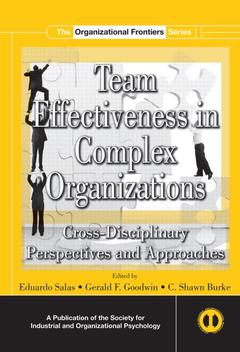Description
Team Effectiveness In Complex Organizations
Cross-Disciplinary Perspectives and Approaches
SIOP Organizational Frontiers Series
Authors: Salas Eduardo, Goodwin Gerald F., Burke C. Shawn
Language: English
Subjects for Team Effectiveness In Complex Organizations:
Keywords
Multiteam System; Team Cognition; performance; Cognitive Similarity; members; Team Performance; knowledge; Teamwork Processes; processes; Vice Versa; teamwork; Team Mental Models; process; Transactive Memory; cognitive; Team Effectiveness; similarity; C2 Team; mental; Team Performance Measures; model; Team Members; Team Adaptation; Ap Ta; SA; Situation Awareness; Command Team Effectiveness; Team Effectiveness Research; Team Adaptability; Simulation Based Team Training; Backup Behavior; Shared Mental Models; Compatible Mental Models; Task Mental Model; Team Processes
Approximative price 71.13 €
In Print (Delivery period: 14 days).
Add to cartPublication date: 02-2013
Support: Print on demand
Approximative price 160.25 €
Subject to availability at the publisher.
Add to cartPublication date: 01-2009
· 15.2x22.9 cm · Hardback
Description
/li>Contents
/li>Biography
/li>
Over the past 40 years, there has been a growing trend toward the utilization of teams for accomplishing work in organizations. Project teams, self-managed work teams and top management teams, among others have become a regular element in the corporation or military. This volume is intended to provide an overview of the current state of the art research on team effectiveness.
Section 1. Setting the Stage. G.F. Goodwin, C.S. Burke, J.L. Wildman, E. Salas, Team Effectiveness in Complex Organizations: An Overview. R.L. Moreland, J.M. Levine, Building Bridges to Improve Theory and Research on Small Groups. E. Salas, M. Rosen, C.S. Burke, G.F. Goodwin, The Wisdom of Collectives in Organizations: An Update of the Teamwork Competencies. Section 2. Cross-Disciplinary Theoretical Perspectives. S. Zaccaro, B. Heinen, M. Shuffler, Team Leadership and Team Effectiveness. S.W.J. Kozlowski, D.J. Watola, J.M. Nowakowski, B.H. Kim, I.C. Botero, Developing Adaptive Teams: A Theory of Dynamic Team Leadership. N.J. Cooke, J.C. Gorman, L. Rowe, An Ecological Perspective on Team Cognition. A.C. Edmondson, K.S. Roloff, Overcoming Barriers to Collaboration: Psychological Safety and Learning in Diverse Teams. C.S. Burke, H.A. Priest, S. Wooten II, D. DiazGranados, E. Salas, Understanding the Cognitive Processes in Adaptive Multicultural Teams: A Framework. J.R. Rentsch, L.A. Delise, S. Hutchison, Cognitive Similarity Configurations in Teams: In Search of the Team MindMeld. L.A. DeChurch, J.E. Mathieu, Thinking in Terms of Multiteam Systems. P.J.M.D. Essens, A.L.W. Vogelaar, J.J.C. Mylle, C. Blendell, C. Paris, S.M. Halpin, J.V. Baranski, Team Effectiveness in Complex Settings: A Framework for Commanders. S. Mohammed, K. Hamilton, A. Lim, The Incorporation of Time in Team Research: Past, Current, and Future. Section 3. Measurement Tools. D. Dorsey, S. Russell, C. Keil, G. Campbell, W. Van Buskirk, P. Schuck, Measuring Teams in Action: Automated Performance Measurement and Feedback in Simulation-Based Training. K.J. Krokos, D. Baker, A. Alonso, R. Day, Assessing Team Processes in Complex Environments: Challenges in Transitioning Research to Practice. Section 4. Methodological Tools and Developments. P. Foltz, M.J. Martin, Automated Communication Analysis of Teams. A.J. Slaughter, J. Yu, L. Koehly, Social Network Analysis: Understanding the Role of Context in Small Groups and Organizations. W. Zachary, B. Bell, J. Ryder, Computational Representations and Methods for Modeling Teams. Section 5. Commentaries and a Summary: The Look Ahead. K. Smith-Jentsch, Measuring Team-Related Cognition: The Devil is in the Details. L. Weingart, M. Cronin, Teams Research in the 21st Century: A Case for Theory Consolidation. E. Salas, J.L. Wildman, Ten Critical Research Questions: The Need for New and Deeper Exploration.
Eduardo Salas is University Trustee Chair and Pegasus Professor of Psychology at the University of Central Florida where he also holds an appointment as Program Director for the Human Systems Integration Research Department at the Institute for Simulation and Training. Before joining UCF, he was a senior research psychologist and Head of the Training Technology Development Branch of NAWC-TSD for 15 years. During this period, Dr. Salas served as a principal investigator for numerous R&D programs that focused on teamwork, team training, simulation-based training, decision-making under stress and performance assessment and measurement. Dr. Salas has co-authored over 300 journal articles & book chapters and has co-edited 19 books. His expertise includes assisting organizations in how to foster teamwork, design and implement team training strategies, facilitate training effectiveness, preventing human error, promote a culture of safety, and develop performance measurement tools. Dr. Salas is a Fellow of the American Psychological Association, the Human Factors and Ergonomics Society, the Association of Psychological Science and a recipient of the Meritorious Civil Service Award from the Department of the Navy.
Jay Goodwin is a Research Psychologist at the U. S. Army Research Institute for Behavioral and Social Sciences. He received his M.S. and Ph.D. in Industrial/Organizational Psychology from Pennsylvania State University. Dr. Goodwin is currently a special projects officer in ARI's Strategic Initiatives Group, with responsibility for topics related to ARI's leader and organization research programs. He is also the ARI liaison for international, defense, and joint R&D. Dr. Goodwin's research expertise is in leadership, team effectiveness, and organizational issues in Joint, Interagency, and Multinational contexts. He was previously employed at the American Institutes for Research, where his project work included t
These books may interest you

Virtual Teams For Dummies 24.87 €



